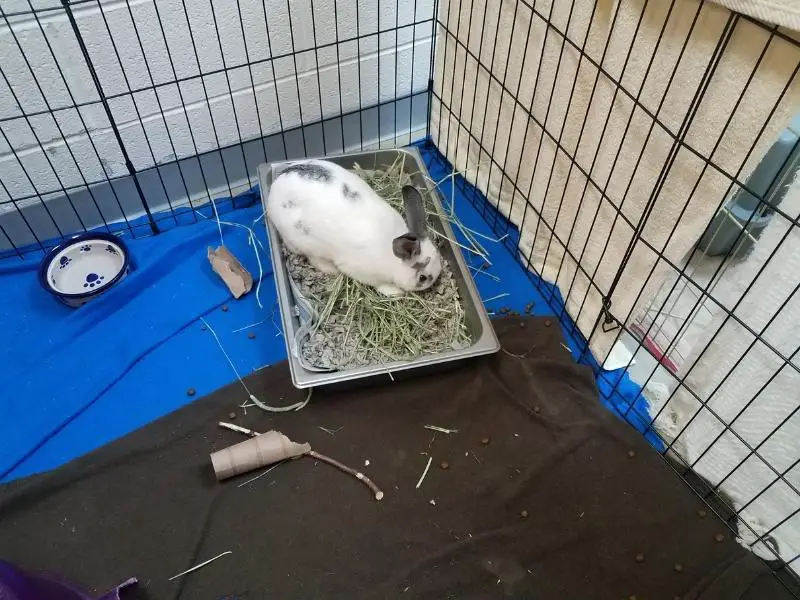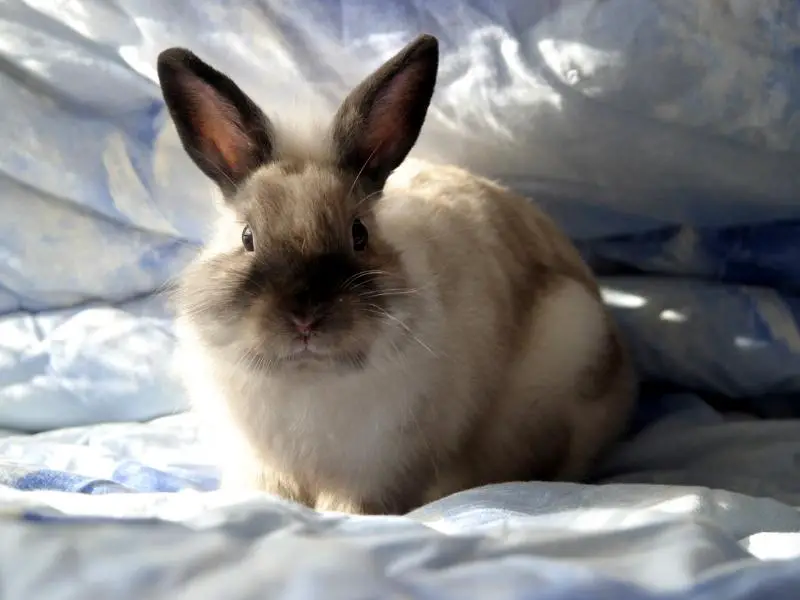Coming home to play with your bun after a long day of work can be so rewarding, but walking through your front door and blocking your nose because there is a foul smell in the air is not ideal (for you or your bunny).
Why does rabbit pee smell so bad, and is this smell harmful to you or your bun?
Rabbit pee smells so bad because it has a high concentration of ammonia in it. Rabbits are very clean animals, and the only bad smell usually comes from their urine. The buck (male rabbit) can produce a much stronger smelling urine (when unaltered) than the doe (female rabbit).
If you are looking at adopting a floppy-eared friend, but you’ve heard the rumors about their urine odor, then this guide will provide you with all the facts regarding rabbit pee and if it really smells that bad.
Reasons Why Your Rabbit Pee Smells So Bad
Some bunnies’ urine smells worse than others, but rabbit pee generally does have an unpleasant smell.
Let’s take a look at a few reasons why rabbit pee smells so bad:
Ammonia-Tinged Urine
Your bunny has a very high concentration of ammonia in its urine. This smell can be very strong, especially straight after urination. Bucks (and sometimes does) naturally mark their territory by spraying urine on different areas.
A buck’s urine is known to have a far more pungent scent than a doe’s.
Unhygienic Cage or Hutch
Rabbits pee a lot (up to 8 times a day, and the volume of pee differs each time). And if you have more than one bunny, the number of pee doubles. If you have bedding or litter in your bunny’s cage, it will absorb the urine.
However, if your rabbit’s living environment is not cleaned at least once a day, the urine-soaked bedding or litter can create an unpleasant odor and grow unwanted bacteria, which makes the bad smell even worse.
Urinary Tract Infections (UTIs)
Rabbits that are around 3 to 5 years old and rabbits that are obese are more likely to suffer from urinary tract infections, which can cause their urine to be even more smelly than usual.
Here are a few symptoms of UTIs in rabbits:
- Brownish-colored urine
- Leaking urine
- Difficulty passing urine
- Urinating little bits of urine frequently
- Skin rash near genitals and hind legs
How Do You Stop Rabbit Urine From Smelling?

Let’s take a closer look at some ways you can stop your floppy-eared friend’s urine from smelling:
Potty Train Your Rabbit
Potty training your bun will take time and patience, but the reward is worth it. Training your bun to use a litter box will help keep all the urine and feces in one place, which makes cleaning so much easier.
Another bonus is that your bunny won’t be sitting in a puddle of their own urine, which will get stuck to their fur, causing a further stink in your bun’s living space.
Plus, wet fur is attractive to flies that then lay their eggs, causing flystrike, which can be fatal.
Sterilize Your Rabbit
Spaying or neutering your rabbit will help reduce the bad smell of rabbit urine by stopping your bucks’ need to mark their territory (which means less urinating) by spraying urine on different surfaces.
Spaying your bun also reduces the musky smell that doe’s give off when they are in heat.
Is the Smell of Rabbit Urine Harmful?
The smell of your bunny’s urine isn’t harmful (even though it smells like ammonia). Still, if your bun’s living environment isn’t regularly cleaned, it creates a very unpleasant aroma in your living space, leading to poor hygiene and the growth of bacteria and microorganisms.
Let’s take a look at some of these harmful bacteria and microorganisms:
Encephalitozoon Cuniculi (E.cuniculi)
E.cuniculi is a microorganism found in even the healthiest of rabbits. This microorganism is now considered a fungus, and your bun sheds the spores through their urine.
Immune-compromised people, such as people with HIV or AIDS or people who are undergoing chemotherapy, can be infected with E.cuniculi through rabbit urine.
The fungus attacks the kidneys, and people who are infected will present with the following symptoms:
- Loss of appetite
- Constantly thirsty
- Experience frequent urination
- Weight loss
People who are not immune-compromised don’t need to be concerned about contracting E.cuniculi. Immune-compromised people should stay clear of the rabbit’s feces and urine until the rabbit has tested negative for infection.
Leptospirosis Bacteria
Leptospirosis is a common bacteria with flu-like symptoms and can be spread from rabbits to humans through contaminated urine that gets into cuts or breaks in the skin. The bacteria can also infect a person through their eyes.
An infected bunny can excrete the bacteria continuously or for several years at a time.
A person who has contracted this bacteria will show the following symptoms:
- Fever
- Pain in the abdomen
- Vomiting and nausea
- Loss of appetite
- Muscle pain and stiffness
- Jaundice (yellowing of the eyes and skin)
- Depression
Ensure you get treatment as soon as possible, as this bacteria can lead to kidney failure and hepatitis.
To avoid contracting this bacteria, it’s best to have your floppy-eared friend vaccinated. Prevention is always better than cure.
How to Remove the Rabbit Pee Smell
The strong smell of rabbit pee can be very overwhelming. Luckily, there are a few ways you can reduce the strong smell of their urine, such as:
- Using an air purifier to keep pee odors to a minimum (for rabbits that live indoors)
- Use rabbit-safe essential oils such as lavender, lemon, eucalyptus, and peppermint to mask the smell of rabbit pee (make sure to dilute the oils with water).
The oils can be placed in the air purifier or sprinkled a drop or two outside your bunny’s enclosure.
- Cleaning up rabbit pee on your floor with vinegar and warm water to remove the smell
My Last Bunny Thoughts
Although rabbits are very clean animals, their urine can be very off-putting, especially if it’s left to lie in your bun’s hutch or living space.
Many people rehome their rabbits because the rabbit urine odor becomes too much. But you can avoid this.
There are so many ways to reduce the bad smell of your bunny’s urine that you should not have to deal with any unpleasant odors:
- Keep your floppy-eared friends’ living space clean
- Empty their litter box at least once a day
- Consider having your bun sterilized to avoid unnecessary spraying of strong-smelling urine

